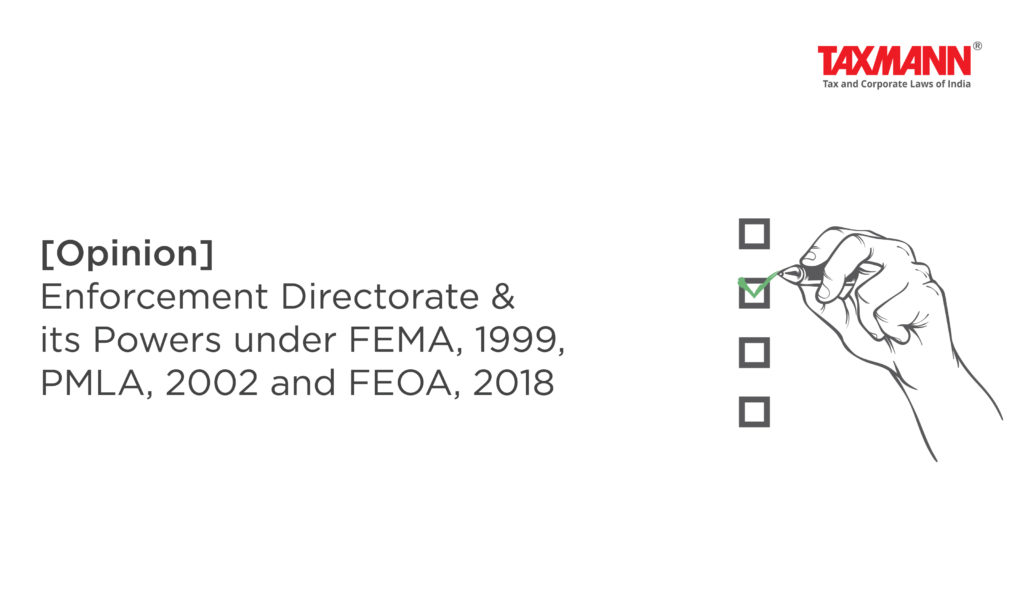[Opinion] Enforcement Directorate & its Powers under FEMA, 1999, PMLA, 2002 and FEOA, 2018
- Blog|News|FEMA & Banking|
- 2 Min Read
- By Taxmann
- |
- Last Updated on 24 May, 2023

Lekshmi N. – [2023] 150 taxmann.com 378 (Article)
Knock Knock
Who’s there?
ED -for investigation
ED Who?
Go through the below mentioned briefs and understand Who’s Who!
Who’s ED?
The investigation of economic crimes and infractions of foreign currency legislation is the responsibility of the Directorate of Enforcement, also known as the ED. This Directorate was first established on May 1st, 1956. The Department of Economic Affairs established the “Enforcement Unit” to handle Exchange Control Law infractions under the Foreign Exchange Regulation Act, 1947 (FERA ’47). This unit, which had Delhi as its base of operations, was led by a Legal Service Officer serving as Director of Enforcement, with assistance from three Special Police Establishment Inspectors and an Officer on appointment from the Reserve Bank of India (RBI). There were two locations: Calcutta and Bombay.
This unit was renamed the “Enforcement Directorate” in 1957, and a second branch was established in Madras. The Department of Economic Affairs turned over management of the Directorate to the Department of Revenue in 1960. With time, FERA’47 was repealed and FERA, 1973 was put in its stead. The Directorate remained under the administrative control of the Department of Personnel & Administrative Reforms for a brief period of four years (1973–1977). Currently, the Department of Revenue, Ministry of Finance, Government of India, has administrative jurisdiction over the Directorate.
The nexus between ED and the Acts
FERA, 1973, a regulatory law, was repealed with the start of the economic liberalisation movement, and in its substitute, the Foreign Exchange Management Act, 1999 (FEMA), went into effect on June 1st, 2000.
The Prevention of Money Laundering Act, 2002 (PMLA) was also passed in accordance with the International Anti-Money Laundering framework, and ED was given responsibility for its enforcement beginning on July 1st, 2005.
The government passed the Fugitive Economic Offenders Act, 2018 (FEOA), and ED is responsible for its enforcement beginning on April 21, 2018, in response to an upsurge in instances involving economic offenders seeking refuge in foreign nations.
Click Here To Read The Full Article
Disclaimer: The content/information published on the website is only for general information of the user and shall not be construed as legal advice. While the Taxmann has exercised reasonable efforts to ensure the veracity of information/content published, Taxmann shall be under no liability in any manner whatsoever for incorrect information, if any.

Taxmann Publications has a dedicated in-house Research & Editorial Team. This team consists of a team of Chartered Accountants, Company Secretaries, and Lawyers. This team works under the guidance and supervision of editor-in-chief Mr Rakesh Bhargava.
The Research and Editorial Team is responsible for developing reliable and accurate content for the readers. The team follows the six-sigma approach to achieve the benchmark of zero error in its publications and research platforms. The team ensures that the following publication guidelines are thoroughly followed while developing the content:
- The statutory material is obtained only from the authorized and reliable sources
- All the latest developments in the judicial and legislative fields are covered
- Prepare the analytical write-ups on current, controversial, and important issues to help the readers to understand the concept and its implications
- Every content published by Taxmann is complete, accurate and lucid
- All evidence-based statements are supported with proper reference to Section, Circular No., Notification No. or citations
- The golden rules of grammar, style and consistency are thoroughly followed
- Font and size that’s easy to read and remain consistent across all imprint and digital publications are applied



 CA | CS | CMA
CA | CS | CMA
